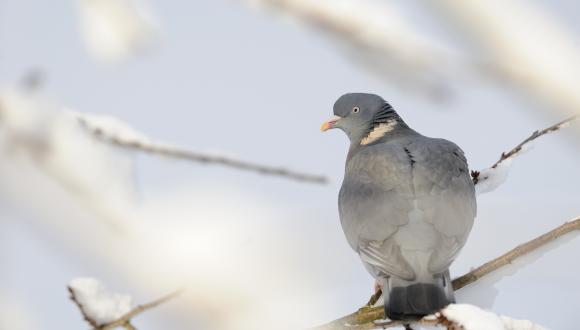General licence for birds - GL12/2023 - To sell certain dead birds which have been captive-bred or legally taken from the European Union
General Licences allow authorised people to carry out activities that would otherwise be illegal under the Wildlife & Countryside Act 1981 (as amended). They cover situations where we are satisfied that there is no other satisfactory solution in respect of the species to which they relate and the circumstances in which the licensed action may be taken.
Terms and conditions
If you operate under General Licence 12/2023 you must meet the following terms and conditions otherwise your actions may be illegal which could lead to prosecution.
What can this General Licence be used for?
Authorised people (operators) can:
(a) sell, hire, barter or exchange
(b) offer or expose for sale, hire, barter or exchange
(c) possess or transport for the purpose of sale, hire, barter or exchange
(d) publish or cause to be published, any advertisement likely to be understood as conveying the intention to buy, sell, hire, barter or exchange any dead wild bird (or part of, or anything derived from such a bird) that has either been bred in captivity or has been legally taken from a Member State of the European Union, other than
Canada goose Branta canadensis
Pink-footed goose Anser brachyrhynchus
Red grouse Lagopus lagopus scoticus
Red-legged partridge Alectoris rufa
Common pheasant Phasianus colchicus
Golden plover Pluvialis apricaria
Common snipe Gallinago gallinago
Barnacle goose Branta leucopsis
White-fronted goose Anser albifrons
Who is authorised to use this General Licence?
Operators can be anyone.
What other information must operators know before considering use of this General Licence?
Operators must:
- understand this General Licence and comply with its terms and conditions
- only use it for the purpose specified above
When and where is this General Licence valid?
Across Scotland from 1 January to 31 December 2023 unless previously revoked.
What restrictions apply to the use of this General Licence?
This General Licence cannot be used by those convicted of a wildlife crime until that conviction is considered spent in accordance with the Rehabilitation of Offenders Act 1974 (as amended), they have received an admonishment or a court discharged them absolutely.
Any person not able to use this General Licence can still apply to NatureScot for an individual licence.
What are the general conditions of this General Licence?
This General Licence only applies to the sale of dead birds that:
a. were bred in captivity. A bird shall not be treated as having been bred in captivity unless its parents were lawfully in captivity when the egg from which it hatched was laid. or
b. originated from a Member State of the European Union and were lawfully removed from the natural state under legal provisions in force in that Member State or with the approval of competent authorities of that Member State. Documentary evidence that the bird was lawfully removed from the natural state must accompany any sale, hire, barter or exchange.
What are the reporting requirements of this General Licence?
- The seller must certify that the record is accurate.
- Any person selling any dead bird must keep a record of all sales. This record must contain details of:
a. The person(s) from whom the seller acquired the bird and the person(s) to whom the bird were sold
b. The species of bird sold, the cause of death (if known), the age of the specimen (if the specimen is over 30 years old this should be noted) and the date of acquisition.
- The seller must submit a report to NatureScot by 31 January 2024 detailing any sale by him in that year of any dead bird, which has not previously been sold. The report should also:
a. state how the seller acquired each such bird; and
b. list the type and number of each species sold.
- The seller shall, on being given reasonable notice in writing, produce the record to a person authorised in writing by NatureScot and the seller shall also permit such an authorised person to inspect the record.
Notes
- This General Licence covers the sale of taxidermy specimens.
- General Licence 11/2023 allows the sale of products or parts of dead birds.
- Further information on goose licensing is available on our website.
Definitions
For the purposes of this General Licence;
- “NatureScot” means Scottish Natural Heritage acting under its operating name NatureScot.
- "wild bird" means any bird of a species which is ordinarily resident in or is a visitor to the UK or any member State or the European territory of any member State in a wild state but does not include poultry. "Bird" includes all stages from chick to adult.
- “wildlife crime” means any offence under the Wildlife & Countryside Act 1981, the Conservation (Natural Habitats &c.) Regulations 1994, the Protection of Badgers Act 1992, the Protection of Wild Mammals (Scotland) Act 2002, Deer (Scotland) Act 1996, Agriculture (Scotland) Act 1948, the Animal Health & Welfare (Scotland) Act 2006, the Protection of Animals (Scotland) Act 1912, the Wild Mammals (Protection) Act 1996 and the Animals & Wildlife (Penalties, Protections and Powers) (Scotland) Act 2020 (all as amended).
Contact
If you already have a licence number, include it in the subject line of your email, or have it to hand when you call.
Disclaimer: Scottish Natural Heritage (SNH) has changed its name to NatureScot as of the 24th August 2020.
At the time of publishing, this document may still refer to Scottish Natural Heritage (SNH) and include the original branding. It may also contain broken links to the old domain.
If you have any issues accessing this document please contact us via our feedback form.




